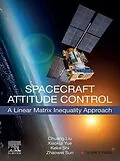Spacecraft Attitude Control: A Linear Matrix Inequality Approach solves problemsfor spacecraft attitude control systems using convex optimization and, specifi cally,through a linear matrix inequality (LMI) approach. High-precision pointing and improvedrobustness in the face of external disturbances and other uncertainties are requirementsfor the current generation of spacecraft. This book presents an LMI approach to spacecraftattitude control and shows that all uncertainties in the maneuvering process can besolved numerically. It explains how a model-like state space can be developed through amathematical presentation of attitude control systems, allowing the controller in question tobe applied universally. The authors describe a wide variety of novel and robust controllers,applicable both to spacecraft attitude control and easily extendable to second-ordersystems. Spacecraft Attitude Control provides its readers with an accessible introductionto spacecraft attitude control and robust systems, giving an extensive survey of currentresearch and helping researchers improve robust control performance. - Considers the control requirements of modern spacecraft - Presents rigid and flexible spacecraft control systems with inherent uncertainties mathematically, leading to a model-like state space - Develops a variety of novel and robust controllers directly applicable to spacecraft control as well as extendable to other second-order systems - Includes a systematic survey of recent research in spacecraft attitude control
Autorentext
Chuang Liu is an Associate Professor at Northwestern Polytechnical University, China. He is also Scientific Committee Member of Aeromeet 2022. He received the COSPAR Outstanding Paper Award for Young Scientists in 2020. His research focuses on aerospace engineering.
Klappentext
Spacecraft Attitude Control: A Linear Matrix Inequality Approach solves problems for spacecraft attitude control systems using convex optimization, and more specifically, through a linear matrix inequalities approach (LMI). High-precision pointing and improved robustness in the face of external disturbances and other uncertainties are requirements for the current generation of spacecraft. The title develops an LMI approach to spacecraft attitude control and shows that all uncertainties in the maneuvering process can be solved numerically. The book develops a wide variety of novel and robust controllers, applicable both to spacecraft attitude control and easily extendible to second-order systems.
This title introduces spacecraft attitude control and robust systems, giving an extensive survey of current research and helping researchers improve robust control performance.
- Considers the control requirements of modern spacecraft
- Presents rigid and flexible spacecraft control systems with inherent mathematic uncertainties that lead to a model-like state-space
- Develops a variety of novel and robust controllers directly applicable to spacecraft control and extendable to other second-order systems
- Includes a systematic survey of recent research in spacecraft attitude control
Inhalt
1. Introduction of basic knowledge 2. State feedback nonfragile control 3. Dynamic output feedback nonfragile control 4. Observer-based fault tolerant delayed control 5. Observer-based fault tolerant nonfragile control 6. Disturbance observer-based control with input magnitude and rate constraints 7. Improved mixed H2/HN control with poles assignment constraint 8. Nonfragile HN control with input constraints 9. Antidisturbance control with active vibration suppression 10. Chaotic attitude tracking control 11. Underactuated chaotic attitude stabilization control
